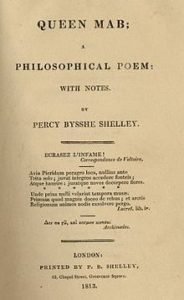Charles Dibdin and Shelley: A New Project Bringing Earlier Queen Mabs to Life
A message from David Chandler (Retrospect Opera):In their Longman edition of Shelley, Geoffrey Matthews and Kelvin Everest state that:
“S.’s title [Queen Mab], designed to camouflage the poem’s atheism and radicalism, probably derives from the numerous children’s stories in the eighteenth century which employed the Queen of the Fairies as a character; see for example Marie Catherine La Mothe, Countess D’Aulnoy, Queen Mab: A Select Collection of the Tales of the Fairies.”
This may underestimate the extent to which Queen Mab was simply a part of English popular culture by the late 1700s. Charles Dibdin (1745-1814), the leading British composer and singer-songwriter of the period, did as much as anyone to popularise Queen Mab. His cantata, Queen Mab, was an important part of David Garrick’s great Shakespeare “Jubilee” of 1769, the most talked about cultural event of the British eighteenth century. Queen Mab then reappears in Dibdin’s 1783 pantomime, Harlequin, The Phantom of a Day, and again in his serenata of 1797, Datchet Mead. Dibdin, so long shockingly neglected, is the subject of an important, recent OUP volume (Charles Dibdin and Late Georgian Culture), and Retrospect Opera, a British charity, is making a sustained attempt to professionally record his music. The good news is that their latest project involves two of the Queen Mab pieces, Queen Mab and Datchet Mead. This is a crowd funded project and Shelleyans and Romanticists of all stamps are warmly invited to support it. More details here.

